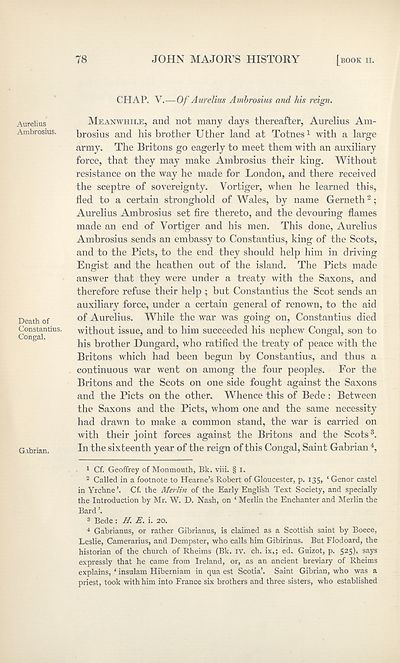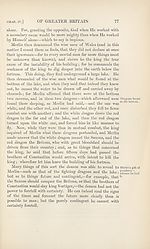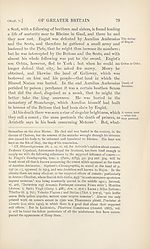Series 1 > History of Greater Britain, as well England as Scotland
(223) Page 78
Download files
Complete book:
Individual page:
Thumbnail gallery: Grid view | List view

78
JOHN MAJOR’S HISTORY
[book II.
CHAP. V.—Of Aurelius Ambrosius and his reign.
Aurelius
Ambrosius.
Death of
Constantius.
Congal.
Gabrian.
Meanwhile, and not many days thereafter, Aurelius Am¬
brosius and his brother Uther land at Totnes1 with a large
army. The Britons go eagerly to meet them with an auxiliary
force, that they may make Ambrosius their king. Without
resistance on the way he made for London, and there received
the sceptre of sovereignty. Yortiger, when he learned this,
fled to a certain stronghold of Wales, by name Gerneth2;
Aurelius Ambrosius set fire thereto, and the devouring flames
made an end of Vortiger and his men. This done, Aurelius
Ambrosius sends an embassy to Constantius, king of the Scots,
and to the Piets, to the end they should help him in driving
Engist and the heathen out of the island. The Piets made
answer that they were under a treaty with the Saxons, and
therefore refuse their help ; but Constantius the Scot sends an
auxiliary force, under a certain general of renown, to the aid
of Aurelius. While the war was going on, Constantius died
without issue, and to him succeeded his nephew Congal, son to
his brother Dungard, who ratified the treaty of peace with the
Britons which had been begun by Constantius, and thus a
continuous war went on among the four peoples. For the
Britons and the Scots on one side fought against the Saxons
and the Piets on the other. Whence this of Bede : Between
the Saxons and the Piets, whom one and the same necessity
had drawn to make a common stand, the war is carried on
with their joint forces against the Britons and the Scots3.
In the sixteenth year of the reign of this Congal, Saint Gabrian 4,
1 Cf. Geoffrey of Monmouth, Bk. viii. § i.
2 Called in a footnote to Hearne’s Robert of Gloucester, p. 135, ‘ Genor castel
in Yrchne’. Cf. the Merlin of the Early English Text Society, and specially
the Introduction by Mr. W. D. Nash, on ‘ Merlin the Enchanter and Merlin the
Bard ’.
3 Bede : H. E. i. 20.
4 Gabrianus, or rather Gibrianus, is claimed as a Scottish saint by Boece,
Leslie, Camerarius, and Dempster, who calls him Gibirinus. But Flodoard, the
historian of the church of Rheims (Bk. iv. ch. ix,; ed. Guizot, p. 525), says
expressly that he came from Ireland, or, as an ancient breviary of Rheims
explains, ‘ insulam Hiberniam in qua est Scotia’. Saint Gibrian, who was a
priest, took with him into France six brothers and three sisters, who established
JOHN MAJOR’S HISTORY
[book II.
CHAP. V.—Of Aurelius Ambrosius and his reign.
Aurelius
Ambrosius.
Death of
Constantius.
Congal.
Gabrian.
Meanwhile, and not many days thereafter, Aurelius Am¬
brosius and his brother Uther land at Totnes1 with a large
army. The Britons go eagerly to meet them with an auxiliary
force, that they may make Ambrosius their king. Without
resistance on the way he made for London, and there received
the sceptre of sovereignty. Yortiger, when he learned this,
fled to a certain stronghold of Wales, by name Gerneth2;
Aurelius Ambrosius set fire thereto, and the devouring flames
made an end of Vortiger and his men. This done, Aurelius
Ambrosius sends an embassy to Constantius, king of the Scots,
and to the Piets, to the end they should help him in driving
Engist and the heathen out of the island. The Piets made
answer that they were under a treaty with the Saxons, and
therefore refuse their help ; but Constantius the Scot sends an
auxiliary force, under a certain general of renown, to the aid
of Aurelius. While the war was going on, Constantius died
without issue, and to him succeeded his nephew Congal, son to
his brother Dungard, who ratified the treaty of peace with the
Britons which had been begun by Constantius, and thus a
continuous war went on among the four peoples. For the
Britons and the Scots on one side fought against the Saxons
and the Piets on the other. Whence this of Bede : Between
the Saxons and the Piets, whom one and the same necessity
had drawn to make a common stand, the war is carried on
with their joint forces against the Britons and the Scots3.
In the sixteenth year of the reign of this Congal, Saint Gabrian 4,
1 Cf. Geoffrey of Monmouth, Bk. viii. § i.
2 Called in a footnote to Hearne’s Robert of Gloucester, p. 135, ‘ Genor castel
in Yrchne’. Cf. the Merlin of the Early English Text Society, and specially
the Introduction by Mr. W. D. Nash, on ‘ Merlin the Enchanter and Merlin the
Bard ’.
3 Bede : H. E. i. 20.
4 Gabrianus, or rather Gibrianus, is claimed as a Scottish saint by Boece,
Leslie, Camerarius, and Dempster, who calls him Gibirinus. But Flodoard, the
historian of the church of Rheims (Bk. iv. ch. ix,; ed. Guizot, p. 525), says
expressly that he came from Ireland, or, as an ancient breviary of Rheims
explains, ‘ insulam Hiberniam in qua est Scotia’. Saint Gibrian, who was a
priest, took with him into France six brothers and three sisters, who established
Set display mode to:
![]() Universal Viewer |
Universal Viewer | ![]() Mirador |
Large image | Transcription
Mirador |
Large image | Transcription
Images and transcriptions on this page, including medium image downloads, may be used under the Creative Commons Attribution 4.0 International Licence unless otherwise stated. ![]()
| Scottish History Society volumes > Series 1 > History of Greater Britain, as well England as Scotland > (223) Page 78 |
|---|
| Permanent URL | https://digital.nls.uk/127734441 |
|---|
| Attribution and copyright: |
|
|---|
| Description | Over 180 volumes, published by the Scottish History Society, containing original sources on Scotland's history and people. With a wide range of subjects, the books collectively cover all periods from the 12th to 20th centuries, and reflect changing trends in Scottish history. Sources are accompanied by scholarly interpretation, references and bibliographies. Volumes are usually published annually, and more digitised volumes will be added as they become available. |
|---|


